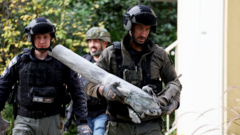Israel and Hezbollah’s Ceasefire: Fragile Hope in Northern Israel
A recent ceasefire between Israel and the Lebanese militia group Hezbollah has brought a tentative sense of hope to northern Israeli communities, though tensions remain high and skepticism is widespread.
On the second day of the ceasefire, the Israeli army reported firing artillery and conducting airstrikes against suspected Hezbollah targets, claiming the militia had breached the agreement’s terms. Lebanon countered by accusing Israel of multiple violations, yet the overall truce appears to be holding.
The conflict, which has lasted over 14 months, has dramatically transformed life in northern Israeli communities. Many residents were evacuated, with towns like Kiryat Shmona becoming ghost-like and scarred by repeated rocket attacks. Chris Coyle, one of only four remaining residents in his apartment complex, described the constant threat, noting that rockets would sometimes land several times an hour.
Israeli leaders are signaling confidence by lifting daily restrictions and removing protective barriers. Prime Minister Netanyahu has warned of an “intensive war” if Hezbollah violates the ceasefire. There’s also international support, with the United States vocally backing the potential for a broader regional peace.
However, not everyone views the ceasefire positively. Michael Kabesa, mayor of Hatzor Haglilit, called it more of a “surrender agreement” than a true ceasefire. He believes Israel stopped short of completing its mission, suggesting Hezbollah will simply regroup and return to conflict in the future.
The focus is now on when and how residents can return to their evacuated communities. Israeli forces are scheduled to gradually hand over control of southern Lebanon to the Lebanese army, with support from UN peacekeepers, American, and French military oversight.
Kabesa emphasized the need for robust security measures, stating that international forces cannot ultimately enforce stability. The October 7th Hamas attacks have profoundly impacted Israeli perspectives on regional security, reinforcing a belief in self-reliance.
Some residents, like Coyle, remain cautiously optimistic. He hopes that if the ceasefire holds for a month, it might bring life back to towns like Kiryat Shmona. An Israeli army captain interviewed expressed similar sentiments, believing this is an opportunity to pause and evaluate the situation.
The ceasefire represents a delicate moment of potential de-escalation. While both sides remain wary, there’s a shared underlying hope that this could be a stepping stone to more sustainable peace. However, the deep-rooted tensions and recent history of conflict mean that trust will take time to rebuild.
The international community, particularly the United States and France, will play a crucial role in maintaining the fragile peace and preventing a return to hostilities.




